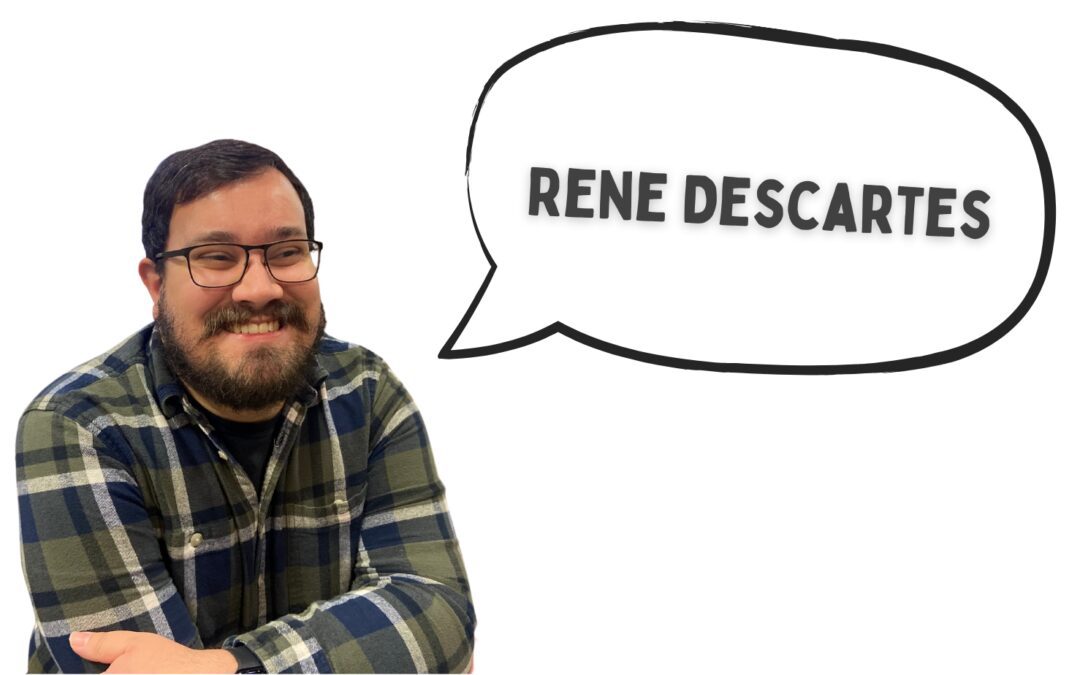Cogito, Ergo Sum (Co-GEET-o Ergo Sum)… translated, “I think therefore I am”.
Hello and Welcome! I’m your host the Pocket Theologian and today we’re discussing the life and philosophy of Rene Descartes, that’s right the mathematician philosopher himself. If you’re new, allow me to explain, I’m the pocket theologian and here on the blog we like to take a theological or philosophical concept and explain it as briefly as possible. We’ll first start with his history, then discuss some notable figures, before going to some key characteristics, and finally some misconceptions. With all that out of the way; let’s get started!
History
Rene Descartes was born on March 31st, 1596 in La Haye, in Touraine, in France. Descartes mother died when he was a year old, and his father was frequently away; leaving him to be raised by his grandmother, where he lived a modest and somewhat comfortable childhood. In 1606, Descartes went to the Jesuit College at La Flèche where he received a very extensive education.
Descartes went to Poitiers in 1614 and obtained a law degree there in 1616, before he traveled abroad for the first time, of what would soon become many times, he went to Breda in the Netherlands where he became an informal student studying mathematics which would soon become a passion of his.
In 1619, Descartes began his so called “study of the world” where he traveled up and down northern and southern Europe, going all over the continent, learning anything and everything he could. To quote the man himself,
“I Resolve to seek no knowledge other than that of which could be found in myself or else in the great book of the world.” it is during this time that Descartes developed his famous idea of “I think therefore I am”.
It’s important to note, that at this point, Descartes viewed himself and everyone else viewed him as a mathematician first and a philosopher second, and really his contributions to the numerical art form can’t be understated; unfortunately though math is not my strong suit, so while I can explain his philosophy, I cannot explain his math.
In 1628 Descartes “retired” (I say that loosely) to the Netherlands in 1628, since France had become a little too hectic and crazy for him. He never married but did have a daughter there in 1635. Unfortunately though, she passed away at the age of five. Around this time, Descartes started up an exciting tutorship of Princess Elizabeth of Bohemia, and at the request of her mother moved to Stockholm, Sweden in 1649 to personally teach her philosophy. Unfortunately, the princess’ busy schedule and unfriendly climate soon lead to Descartes coming down with a bad case of pneumonia, which then led to his passing on February 11, 1650 in Sockholm, Sweden.
Influenced by these Notable Figures
Isaac Beeckman: So Beeckman was probably the most influential of Descartes mentors, and could be responsible for why Descartes career took on such a mathematical nature, as the two met when Descartes was in the military as a young man and bonded over their shared interest in mathematical subjects. Including some of Gallileo’s ideas, which Beeckman introduced Descartes to, and Descartes dedicated one of his works to Beeckman. However, the two fell out over exactly how much influence he had in Descartes discoveries but the two men kept their discourse until Beeckman died in 1637.
Marin Mersenne: So Marin was one of Descartes school teachers in Paris, where he taught theology and philosophy, but had an interest in science and math and pushed Descartes mathematical skill in the area of optics, which led Descartes to form his first law of refraction, and the two corresponded some time after. So it’s fair to say his addition to Descartes life was far from microscopic.
Influenced these Notable Figures
Francis Bacon: So this one comes much more from a peer approach as opposed to a student or teacher approach. But basically, both Bacon and Descartes believed that things should be proven through theory and experimentation rather than just through conceptualization. They believed this would lead to better science and by extension, a better world.
Isaac Newton: So Descartes ideas and proofs on science and mathematics helped Newton to develop the theories that soon led to many of Newton’s discoveries.
Key Characteristics
Logic and the Human mind: So like we previously mentioned, Descartes believed that as people we can discover everything we need to be content with life with nothing else than our mind. Our mind allows us to perfectly discover and find enlightenment and contentment, to further this thought Descartes believed that most things wrong with the world are because we misuse our minds. This can be summed up in the essential Descartes phrase… “I think therefore I am”. So one of the essential quintessential philosophical questions is “how can you tell what is real” or “how can you tell that you are real?” to interpret this to the modern day, how do you know your not in the matrix, or in a perfect simulation. Descartes answer to this questions was “I think therefore I am”. Or in Latin, “Cogito Ergo Sum” Descartes reasoning was that if we were in a simulation we wouldn’t have any need to think or analyze things in life, so therefore because we have this capacity we can know that we exist, and are real.
Method of Doubts: This was Descartes “Socratic method”, so to speak. He said that in order to better understand bigger questions you should break them down into significantly smaller problems. For example, “what is good?” Well, to break this down what does good mean? What are we trying to achieve by deciding it? Is it good for everyone or good for some people? and so on. He compared this to a barrel of apples, both good and bad ones are in it, and to be a true philosopher means to sit down and sort through ALL of the apples to make sure they’re all good.
Six Passions: Wonder, Love, Hatred, Desire, Joy, Sadness… Descartes thought that these were the six passions that all humans possessed and were informed by at various times in their lives. Now it’s important to note that Descartes DID NOT subscribe to Epicurus ideas, he believed passions should be controlled, rather than indulged in. But, he believed that this could only be done through understanding, and that by experience and learning from the book of life you could discover which passions needed control and which ones didn’t.
Misconceptions
Rene Descartes thought that everything someone needed to know could be realized within themselves: This isn’t true, Descartes believed a person had to go out and live life in order to fully learn in his own words, “learn from the book of life”. So Descartes believed that experience and rationalism were both of equal importance in a persons life, not one dominating the other.
Rene Descartes didn’t like education: Many believe by the previous point that Descartes didn’t like school or book learning, this comes from a quote of his that his education, “clouded his mind”. It’s important to note though that he said HIS education, not all education, everywhere! Descartes himself was a tutor and mentor often, and he DID plan to have his own daughter tutored by the major schools of the day, educating others, so he would be a hypocrite if he didn’t think education was worthwhile.
Rene Descartes didn’t like committees: This comes from his assertion that works of individuals are likely superior to those worked on by committee because the individuals eye view is focused better than a group one. This isn’t necessarily true, that he didn’t like groups, he simply believed that work done as a group NEEDS to be checked for accuracy and legitimacy.
That’s all I have for you today… Go in Peace!


Recent Comments